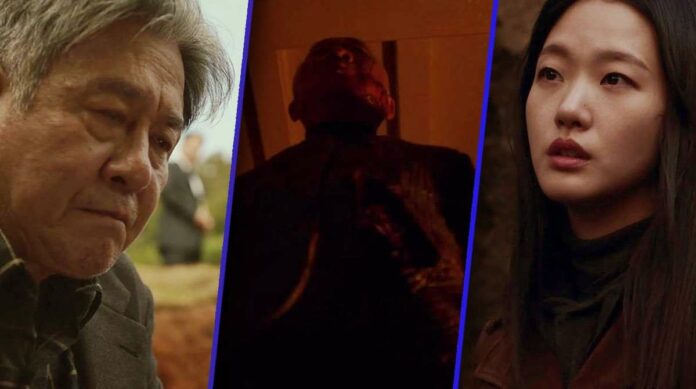The scare factor and narrative brilliance of Exhuma might not be up there with some of the best Korean folk horrors that have graced the silver screen in recent years, but the way the movie has rooted itself in the country’s history through focusing on an established indigenous belief system and revisiting the tragedy of the land through political intrigue deserves much recognition. While the elements of shamanism and feng-shui highlight the richness of Korean cultural heritage, the horror element added through the inclusion of the evil spirits represents past wounds of the colonial era from which the nation hasn’t healed yet.
Throughout the course of the movie, the team of protagonists confronts two malevolent spirits, the first one being the vengeful ghost of their wealthy client Park Ji-Yong’s grandfather, and the second one an Anima, sealed within a massive Japanese Samurai ghoul. The narrative showcases a historical connection—a point of commonality that exists between these spirits—and by unearthing the details of the connection, the team of protagonists is able to finally stop the terrible afflictions caused by these dark beings. By integrating historical connotations, the representation of evil takes on an added dimension, which Exhuma showcases pretty well.
Spoilers Ahead
What Was the Commonality Between the Samurai Ghoul and the Vengeful Ghost?
Evil has many shades in Exhuma, although the darkness perpetrated by them remains the same. The movie begins following a seemingly ordinary haunting or possession route but goes on hinting at something sinister lurking in the backdrop, and the second half of the story turns out to be a full-blown monster mayhem. We follow Hya-Rim, Sang-Deok, and their associates as they perform the exhumation procedure of Park Ji-Yong’s great-grandfather, whose call from the grave has plagued the family’s descendants for generations. Soon enough, it becomes clear that Park and his family have been hiding some sensitive secret about their ancestor, which eventually comes out in the open after a number of family members die horrifically at the hands of the vengeful ghost and a vertically buried coffin gets excavated from underneath the previous grave. It is revealed that Park’s great-grandfather, Marquis Park Geun-Hyun, a Korean war general, infamously betrayed his nation during the Japanese occupation of Korea, which lasted over three decades (1910–1945).
Sang-Deok presumes that due to his allegiance with the invading Japanese and his crimes against his countrymen, Park Geun-Hyun received posthumous retribution by getting buried in a place with bad feng-shui, which is why his spirit has been tormented for a century ever since and is seeking vengeance. However, this assumption proves to be wrong, as the priest who performed his final rites and chose the burial site is revealed to be a Japanese monk named Gisune, and he was Park Geun-Hyun’s close associate who helped him in his deceitful actions. As more secrets unfold, Hwan-Rim reveals that her late grandmother, an immensely strong shaman, had revealed that Gisune wasn’t an ordinary monk and, in all probability, was an incarnation of the Japanese Fox spirit Kitsune, who was present during the first Japanese invasion of Korea during the final days of the Sengoku period.
During the first Japanese invasion under the Toyotomi shogunate, the nation of Korea was able to defend itself. Facing imminent defeat, some of the Japanese Onmyojis, like Gisune, who used to be an integral part of the shogunate administration, decided to curse the land as a final blow. Iron stakes were buried across Korea in a strategic manner, which disrupted the natural flow of energy. Mountains and ground elemental forces are considered sacred in Korean shamanism (the Bokusgo temple was established underneath the mountain), and Gisune’s act of driving an iron stake through the ground desecrated the places. For a country that still prioritizes feng shui in different aspects of life, it was an attack on the indigenous belief system. For Gisune, a cunning evil mastermind, the iron stake was a cursed katana, which had been drenched with the blood of thousands of enemies, and he sealed the katana within the body of a deceased samurai. The body of the samurai acted both as a vessel and as a protector of the katana, and the anima of the katana drove the samurai to action. Gisune’s motivation for burying Park Geun-Hyun atop the katana-sealed samurai was simple yet effective. The social status of Geun-Hyun ensured additional security from grave diggers and also from the feng-shui experts who might have tried to dig out the anomaly buried inside. There is also a hint of the anima of the katana having a Buddhist heritage, as the samurai ghoul emerged from his five centuries-long slumber and began wreaking havoc—it stopped after noticing a Buddhist pagoda. The sight of an evil presence chanting the religious scriptures is fascinatingly terrible, but as long as the samurai ghost remained trapped by Gisune’s enchantment, there was no nirvana for him. Eventually, the precepts of feng-shui proved useful to release the katana and the samurai from their corrupted forms and free the land at the same time.
Exhuma digs deep into uncovering the country’s painful past and focuses on two historically important timelines, with the common factor being Japan’s invasion of the nation. The colonial past had left scars on the minds of the generations who survived the atrocities, and as a part of the invading force, Gisune’s act of invoking the evil spirits is a symbol of that.

